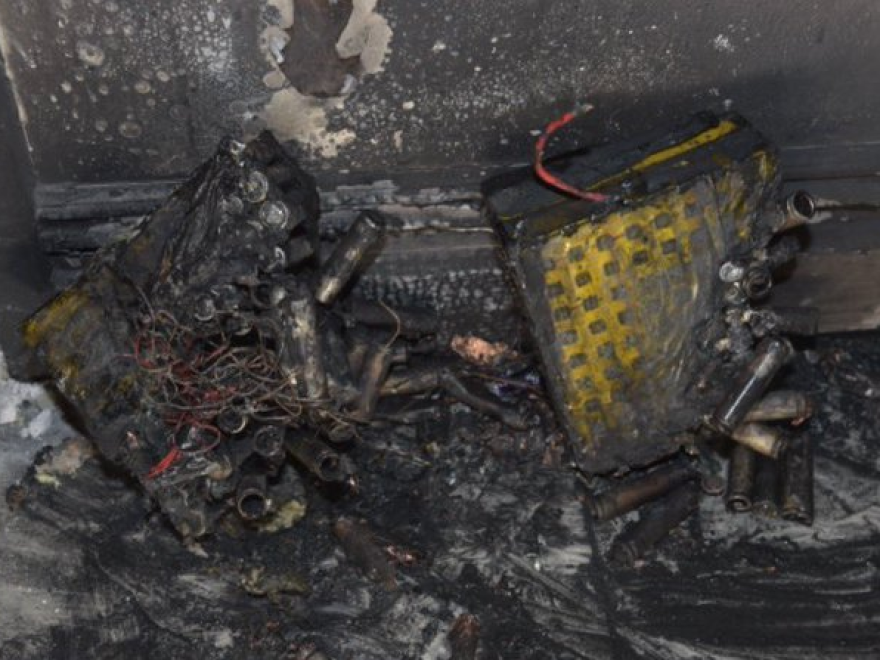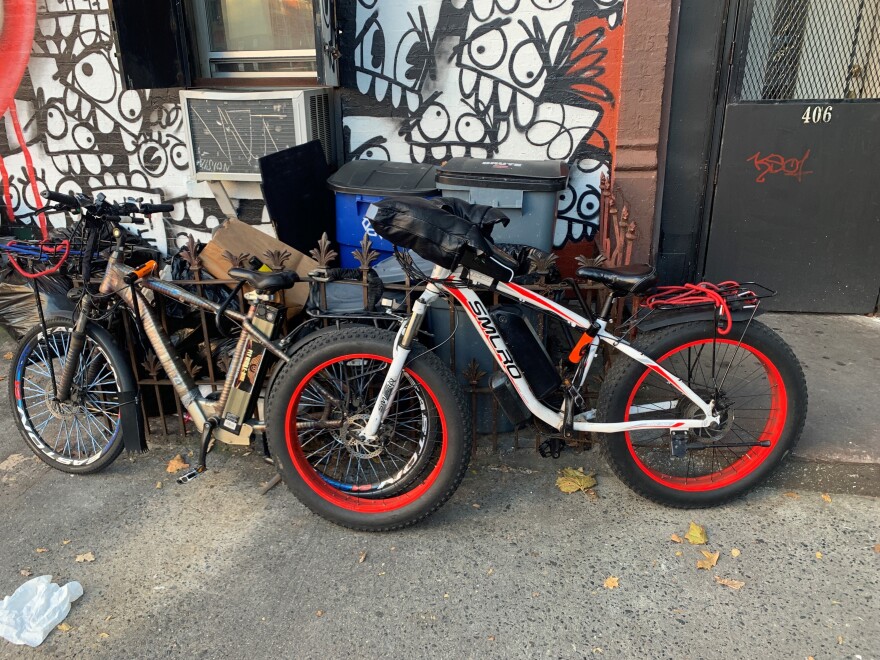NEW YORK — Four times a week on average, an e-bike or e-scooter battery catches fire in New York City.
Sometimes, it does so on the street, but more often, it happens when the owner is recharging the lithium ion battery. A mismatched charger won't always turn off automatically when the battery's fully charged, and keeps heating up. Or, the highly flammable electrolyte inside the battery's cells leaks out of its casing and ignites, setting off a chain reaction.
"These bikes when they fail, they fail like a blowtorch," said Dan Flynn, the chief fire marshal at the New York Fire Department. "We've seen incidents where people have described them as explosive — incidents where they actually have so much power, they're actually blowing walls down in between rooms and apartments."
Brooklyn: 374 East 9th Street @FDNY operating at a 3 Alarm Fire in a 3 story private dwelling with extention to adjoining building pic.twitter.com/oCs3VI39SQ
— NYRRT (@NYRRT) April 21, 2022
A fire in Brooklyn in April was traced to a faulty e-bike or e-scooter battery that ignited and gutted two houses.
And these fires are getting more frequent.
As of Friday, the FDNY investigated 174 battery fires, putting 2022 on track to double the number of fires that occurred last year (104) and quadruple the number from 2020 (44). So far this year, six people have died in e-bike-related fires and 93 people were injured, up from four deaths and 79 injuries last year.
In early August, a 27-year-old Venezuelan immigrant, identified as Rafael Elias Lopez-Centeno, died after his lithium ion battery caught fire and ripped through the Bronx apartment where he was staying. Carmen Tiburcio, a neighbor, said Lopez's aunt told her he had tried to escape through the front door, but the bike was in the way. Instead, he took refuge in the bathroom, where he tried to fill up the bathtub with water to protect himself from the flames. But the smoke got to him, she said.
"He didn't make it," Tiburcio said. "His lungs were very bad."
Another danger to delivery work
Many, if not most, of the fires in New York involve e-bike batteries owned by restaurant delivery workers, who work long shifts, traveling dozens of miles a day.
"The bikes tend to get beat up, subjected to the elements," Flynn said. "They're not really made for our streets."
The longer the batteries are used, the more time it takes to fully recharge them, and it can take up to 8 hours. That in turn makes it harder for owners to keep on eye on their batteries the whole time they are plugged in, which is key for safety.

In addition, new batteries are costly, and the temptation to opt for a less-expensive refurbished battery for much less money is great — especially for couriers who make an average of $12.21 an hour after expenses, according to a survey by Los Deliveristas Union, an advocacy and membership organization.
Several e-bike owners interviewed by NPR in New York City said they were aware of the risks batteries posed, and took measures to reduce them.
"A lot of guys have four, five, six bikes in their apartment and they swap out chargers for different bikes when it doesn't belong to that bike," said Rafael Cardanales, who lives on the Lower East Side. "You can't just use any charger, you know."
Musfiqur Rahman said that when he first got into the delivery business, he bought two new Arrow brand batteries — for $550 each. He did it specifically to avoid fires.
"As far as I know, this brand never get involved in this kind of incident," the 27-year-old Bangladeshi immigrant said.
The FDNY says most batteries are so destroyed by fire when they inspect them that they can make no conclusions about which brand is safer than another.
View this post on Instagram A post shared by FDNY (@fdny)
The FDNY has begun posting videos on social media warning about the dangers of recharging lithium ion batteries.
Living in close quarters
E-bike related fires have occurred elsewhere, such as London, San Francisco, Michigan and South Florida. But nowhere does concern for them appear to be as high as in New York, perhaps because of the prevalence of apartment living — and also the prevalence of ordering take-out.
While restaurants sometimes store bikes overnight for employees, fewer people are now working for particular restaurants and many more for themselves, using apps like Door Dash or Uber Eats to connect with customers. And these couriers often don't have any other place to store and recharge their e-bikes except in their apartments.
That, in turn, creates a fire hazard not just for the workers, but also for their neighbors. This summer, the New York City Housing Authority proposed banning e-bikes and batteries from its 2,600 buildings. But the proposal created an uproar, and officials have not gone through with it.

City councilmembers have proposed their own solutions. One bill, for instance, would ban the sale of used batteries within city limits. Another would require all batteries to be sold to be approved by a national testing service, such as Underwriters Laboratories. Mayor Eric Adams recently announced he would direct $1 million to create hubs for delivery workers with charging stations and other amenities — though they would likely be used during the day and not provide overnight charging.
Councilmember Gale Brewer, who sponsored the legislation that would outlaw the sale of used batteries, says she recognizes that new batteries could be prohibitively expensive to delivery workers.
"They do, you know, God's work, so to speak, because New Yorkers like to have food delivered," she said. "So now the question is how do they get the new batteries that are not going to cause fires?"
Copyright 2022 NPR. To see more, visit https://www.npr.org.



